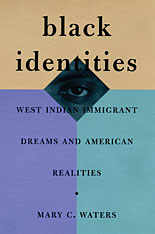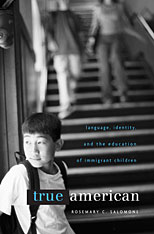
The story of West Indian immigrants to the United States is considered a great success. Many of these adoptive citizens have prospered, including General Colin Powell. But Mary Waters tells a very different story about immigrants from the West Indies, especially their children.
She finds that when the immigrants first arrive, their knowledge of English, their skills and contacts, their self-respect, and their optimistic assessment of American race relations facilitate their integration into the American economic structure. Over time, however, the realities of American race relations begin to swamp their positive cultural values. Persistent, blatant racial discrimination soon undermines the openness to whites the immigrants have when they first arrive. Discrimination in housing channels them into neighborhoods with inadequate city services and high crime rates. Inferior public schools undermine their hopes for their children's future. Low wages and poor working conditions are no longer attractive for their children, who use American and not Caribbean standards to measure success.
Ultimately, the values that gained these first-generation immigrants initial success--a willingness to work hard, a lack of attention to racism, a desire for education, an incentive to save--are undermined by the realities of life in the United States. In many families, the hard-won relative success of the parents is followed by the downward slide of their children. Contrary to long-held beliefs, Waters finds, those who resist Americanization are most likely to succeed economically, especially in the second generation.

How can schools meet the needs of an increasingly diverse population of newcomers? Do bilingual programs help children transition into American life, or do they keep them in a linguistic ghetto? Are immigrants who maintain their native language uninterested in being American, or are they committed to changing what it means to be American?
In this ambitious book, Rosemary Salomone uses the heated debate over how best to educate immigrant children as a way to explore what national identity means in an age of globalization, transnationalism, and dual citizenship. She demolishes popular myths—that bilingualism impedes academic success, that English is under threat in contemporary America, that immigrants are reluctant to learn English, or that the ancestors of today’s assimilated Americans had all to gain and nothing to lose in abandoning their family language.
She lucidly reveals the little-known legislative history of bilingual education, its dizzying range of meanings in different schools, districts, and states, and the difficulty in proving or disproving whether it works—or defining it as a legal right.
In eye-opening comparisons, Salomone suggests that the simultaneous spread of English and the push toward multilingualism in western Europe offer economic and political advantages from which the U.S. could learn. She argues eloquently that multilingualism can and should be part of a meaningful education and responsible national citizenship in a globalized world.
READERS
Browse our collection.
PUBLISHERS
See BiblioVault's publisher services.
STUDENT SERVICES
Files for college accessibility offices.
UChicago Accessibility Resources
home | accessibility | search | about | contact us
BiblioVault ® 2001 - 2024
The University of Chicago Press









